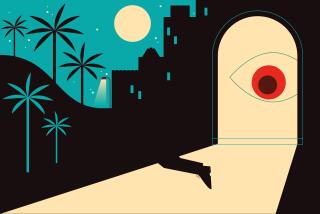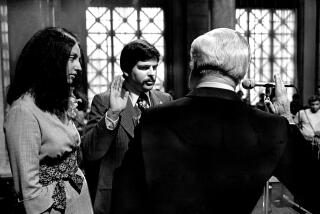It’s Not Business That’s Bad--It’s the State : BUSINESS AS A CALLING: Work and the Examined Life by Michael Novak; Free Press; $22.50, 246 pages
Michael Novak, who trained for the Catholic priesthood but left before being ordained (moving on to become a U.S. ambassador and the author of more than 25 books on philosophy, religion, economics and politics), wants very much to change the public’s negative perception of business and its practitioners. This is not an aspect of American life, he argues, that is built on or thrives on greed. The impulse to go into business, to engage in commerce bears more in common with religious calling than it does with striving after material wealth.
“Today’s most religious people,” reads one chapter subhead, “work in business” (45% of people in the military get to church once a week, 35% of people in business and “people in the movie industry are the worst: only 4% every week”).
Who is responsible for perpetuating the myth that business is immoral? “Literary elites,” artists and intellectuals! People who also, Novak tells us, hold the “odd” idea “that it is unfair that some people are rich while others aren’t.”
In fact, our “high culture” creates several obstacles to the development of the virtuous society by failing to encourage character development, failing to strengthen the family and ignoring the study of ethics in academia.
*
Let’s pass over that well-trodden ground and continue with the arc of this sincerely told, if somewhat outdated story. Novak, in his tradition as ethicist, starts by exploring the possibilities of business, “especially its moral and religious possibilities.” The chapters on business as a calling use examples primarily from the world of Fortune 500 high finance, with quotes from upper-echelon management that are compelling and convincing.
But the next chapters deal with the interdependence of capitalism and democracy, and here the ideas become staler, a little less reliable in today’s context: “Capitalism is a system that commends itself best to the middle-aged, after they have gained some experience in the way history treats the plans of men.”
Commerce is necessary, he argues, for the success of republican government because it “defeats envy” and “defeats the tyranny of a majority.”
He draws on Montesquieu: Democracy is more likely to succeed if it is built upon “the commercial and industrial classes than if built upon the military, aristocratic, priestly, or landed classes.” (It may be important for Novak to choose, in 1996, between class and community as pillars of democracy, in any event, the aristocracy in this country has, at least since the beginning of this century, been the business class.)
*
But the next chapters, on virtue and ethics, contain the top of the arc, and the story moves down the dramatic curve from there.
“At the end of the day,” writes Novak, too late in the book, “human beings are moral animals.” This is the assumption that the book rests on, and presents the problem that Tocqueville and many, many others have raised.
“Business cannot go forward, without a highly motivated and virtuous work community,” Novak writes. “It cannot endure without leaders and colleagues in whom key virtues are internalized.”
Not all business leaders have the key virtues internalized, and whose key virtues are we calling key? And so, these chapters through to the end of the book are a rather shrill series of shoulds; cardinal virtues businesses should adopt, profitability should not be the only indicator of success, businesses should help the homeless in their communities.
Who’s gonna make them, is the age-old question. Which brings us around to the state, or, what Novak calls the welfare state. From his perspective, the state is right up there with the literary elites, shouldering the responsibility for the decline of virtue. Corporate downsizing, on the other hand is a necessary evil. So, in the end, we are left with the same model: Business is good, the state is bad. Business, as in feudal times, depends on class systems and leadership. That leadership must have moral integrity.
Would it were so.
More to Read
Sign up for our Book Club newsletter
Get the latest news, events and more from the Los Angeles Times Book Club, and help us get L.A. reading and talking.
You may occasionally receive promotional content from the Los Angeles Times.






